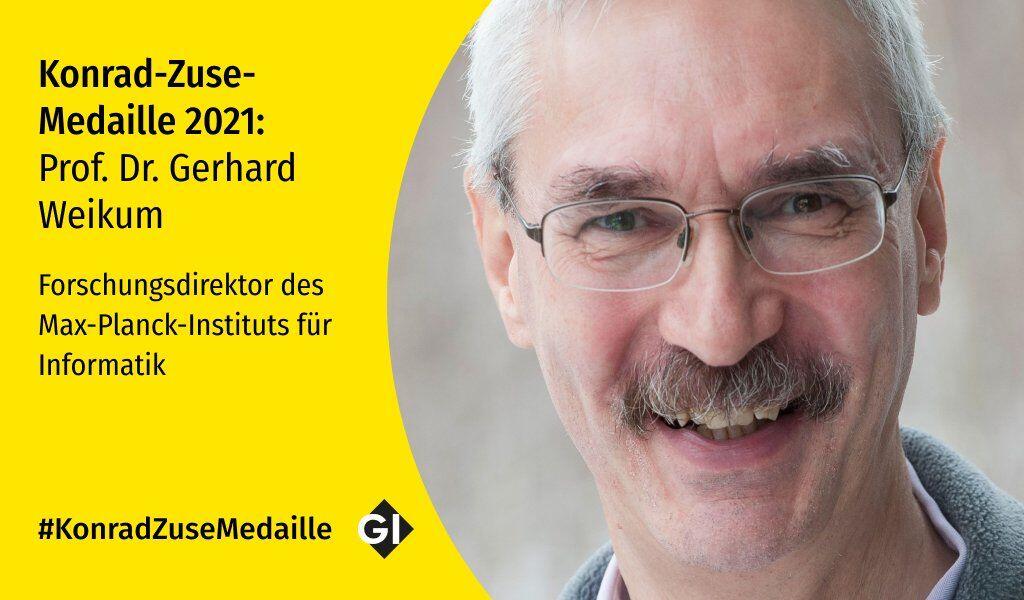Zuse Medal for Saarbrücken Computer Science Professor Gerhard Weikum

Equipping computers with world knowledge has been a dream of artificial intelligence for decades, thought to be unattainable. Until the mid-2000s, knowledge bases were constructed manually, so they were very limited in their content coverage. With the YAGO project, Weikum and his team made a breakthrough in algorithmically building large knowledge bases about people, places, products and other entities in a scalable way. The YAGO knowledge base became a groundbreaking proof-of-concept that demonstrated that automated methods can achieve extremely high quality. YAGO’s error rate was less than five percent and even less than one percent in key parts. This work has inspired numerous projects around the world, particularly the development of so-called Knowledge Graphs at Google, Microsoft, Amazon, Alibaba, Bloomberg and others. Machine knowledge about people, places, organizations, products and events now supports search engines, data analytics and AI-based recommendation systems.
Commenting on the motivation for this long-standing work, Gerhard Weikum, who is also a co-opted computer science professor at Saarland University, says: “There are many information needs that can in principle be well satisfied with content from the Internet, but the relevant knowledge is distributed across all kinds of data sources and you just don’t know these sources.” A search for women on the board of directors of IT companies with annual sales of 100 million euros or more would be very easy if all the facts needed for this were available in a single database; but this database does not exist. Before the introduction of Knowledge Graphs, search engines could do little with such queries either – they merely provided links to web pages that had to be laboriously read through. At best, this would have yielded a few exemplary hits, but not a comprehensive list of answers. Gerhard Weikum adds: “Many things have become possible with knowledge bases for search engines and voice assistants. The example of women on IT boards is probably still too complex. We also need future research to further develop knowledge bases and, in particular, to link machine learning and machine knowledge even better.”
Gerhard Weikum studied computer science at the Technical University of Darmstadt and received his doctorate there in 1986. After a postdoctoral period in Austin, Texas, and an assistant professorship at ETH Zurich, he was appointed to a chair in computer science at Saarland University in Saarbrücken in 1994. In 2003, the Max Planck Society appointed him a scientific member and director at the Max Planck Institute for Computer Science.
Gerhard Weikum is a Fellow of the Gesellschaft für Informatik and the worldwide umbrella organization Association for Computing Machinery (ACM), as well as a member of several academies. He was awarded a Google Focused Research Award in 2010 and the ACM SIGMOD Edgar F. Codd Innovations Award in 2016, among others. The first publication on the YAGO knowledge bank, co-authored with then PhD students Fabian Suchanek and Gjergji Kasneci, has over 4000 citations and received the 2018 WWW Test-of-Time Award for the most influential publications at the Web Conference. In 2013, Weikum, along with Michael Backes, Peter Druschel, and Rupak Majumdar, received the ERC Synergy Grant European Research Award.
Beyond his scientific contributions, Weikum has also been heavily involved in the self-organization of science. Among other things, he served six years on the Science Council, the body appointed by the German president to advise the federal and state governments on science policy issues.
Of his awards, Weikum says, “These are all team successes. My students, doctoral students and collaborators have played a huge part. The creativity of young people in computer science is impressive. The excellent environment at the Saarbrücken computer science campus, which is characterized by team spirit, has also contributed a great deal. For example, important ideas and results emerged in the context of the cluster of excellence on multimodal computing, which included many colleagues from the university and the affiliated institutes.” With this latest award, Saarbrücken Computer Science now boasts 18 awards through Zuse medals, Leibniz prizes and admissions to the Leopoldina Academy.
Further information:
Society for Computer Science website: http://www.gi.de
Website Konrad Zuse Medal: https://gi.de/ueber-uns/personen/konrad-zuse-medaille
Website Gerhard Weikum: http://people.mpi-inf.mpg.de/~weikum/
Press contact:
Bertram Somieski
Max Planck Institute for Computer Science
Public Relations
Phone: +49.681.9325-5710
Email: somieski(at)mpi-inf.mpg.de

